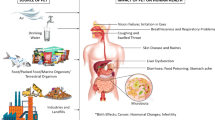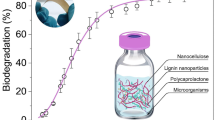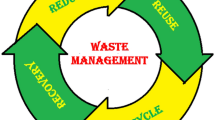Abstract
Microplastics can pass through many filtration systems due to their small size, making it difficult to remove them from water. In this study, we investigated the ability of graphene oxide-based metal oxide nanomaterials to degrade microplastic particles from polyethylene in aqueous solutions. The degradation experiments were conducted in a bath system under ultraviolet light to optimize the photocatalyst amount, initial pH, and contact time. After 480 min, a mass loss of 35.66–50.46% was achieved. The degradation kinetics fitted well with a pseudo-first-order model. Degradation was monitored with an optical microscope and FTIR, and the presence of carbonyl groups was recorded to ensure the degradation of the microplastic. The effects of time, nanocomposite to polyethylene ratio, and pH on degradation efficiency were also studied using response surface methodology (Box–Behnken design). The adequacy of the model was evaluated by analysis of variance (ANOVA). Based on the significant terms and model results, an empirical model was developed to theoretically predict the degradation efficiency. Our study demonstrated the potential advantages of graphene oxide-based metal oxide nanomaterials for the removal of polyethylene microplastic particles through an environmentally friendly and highly efficient process.







Similar content being viewed by others
Data availability
The datasets used and/or analyzed during the current study are available from the corresponding author on reasonable request.
References
Abbasi S, Moore F, Keshavarzi B (2021) PET-microplastics as a vector for polycyclic aromatic hydrocarbons in a simulated plant rhizosphere zone. Environ Technol Innov 21:101370. https://doi.org/10.1016/j.eti.2021.101370
Ariza-Tarazona MC, Villarreal-Chiu JF, Barbieri V, Siligardi C, Cedillo-González EI (2019) New strategy for microplastic degradation: green photocatalysis using a protein-based porous N–TiO2 semiconductor. Ceram Int 45(7):9618–9624. https://doi.org/10.1016/j.ceramint.2018.10.208
Ariza-Tarazona MC, Villarreal-Chiu JF, Hernández-López JM, Rivera De la Rosa J, Barbieri V, Siligardi C, Cedillo-González EI (2020) Microplastic pollution reduction by a carbon and nitrogen-doped TiO2: effect of pH and temperature in the photocatalytic degradation process. J Hazard Mater 395(April):122632. https://doi.org/10.1016/j.jhazmat.2020.122632
Azeez F, Al-Hetlani E, Arafa M, Abdelmonem Y, Nazeer AA, Amin MO, Madkour M (2018) The effect of surface charge on photocatalytic degradation of methylene blue dye using chargeable titania nanoparticles. Sci Rep 8(1):1–9. https://doi.org/10.1038/s41598-018-25673-5
Chamas A, Moon H, Zheng J, Qiu Y, Tabassum T, Jang JH, Abu-Omar M, Scott SL, Suh S (2020) Degradation rates of plastics in the environment. ACS Sust Chem Eng 8(9):3494–3511. https://doi.org/10.1021/acssuschemeng.9b06635
Choi J, Oh H, Han SW, Ahn S, Noh J, Park JB (2017) Preparation and characterization of graphene oxide supported Cu, Cu2O, and CuO nanocomposites and their high photocatalytic activity for organic dye molecule. Curr Appl Phys. https://doi.org/10.1016/j.cap.2016.11.020
Conley K, Clum A, Deepe J, Lane H, Beckingham B (2019) Wastewater treatment plants as a source of microplastics to an urban estuary: removal efficiencies and loading per capita over one year. Water Res X 3:100030. https://doi.org/10.1016/j.wroa.2019.100030
Deng Y, Zhang Y, Lemos B, Ren H (2017) Tissue accumulation of microplastics in mice and biomarker responses suggest widespread health risks of exposure. Sci Rep 7:1–10. https://doi.org/10.1038/srep46687
Fadli MH, Ibadurrohman M, Slamet S (2021) Microplastic Pollutant Degradation in Water Using Modified TiO Photocatalyst under UV-Irradiation. In: IOP Conference Series: Materials Science and Engineering, 1011(1). https://doi.org/10.1088/1757-899X/1011/1/012055
Frias JPGL, Sobral P, Ferreira AM (2010) Organic pollutants in microplastics from two beaches of the Portuguese coast. Mar Pollut Bull 60(11):1988–1992. https://doi.org/10.1016/j.marpolbul.2010.07.030
García-Montelongo XL, Martínez-De La Cruz A, Vázquez-Rodríguez S, Torres-Martínez LM (2014) Photo-oxidative degradation of TiO2/polypropylene films. Mater Res Bull 51:56–62. https://doi.org/10.1016/j.materresbull.2013.11.040
Guerrero-Fajardo CA, Giraldo L, Moreno-Piraján JC (2020) Preparation and characterization of graphene oxide for Pb(II) and Zn(II) ions adsorption from aqueous solution: experimental, thermodynamic and kinetic study. Nanomaterials 10(6):1022. https://doi.org/10.3390/nano10061022
Hamoda MF, Attia NF, Al-Ghusain IA (2015) Performance evaluation of a wastewater reclamation plant using ultrafiltration and reverse osmosis. Desalin Water Treat 54(11):2928–2938. https://doi.org/10.1080/19443994.2014.914447
Hernández-Majalca BC, Meléndez-Zaragoza MJ, Salinas-Gutiérrez JM, López-Ortiz A, Collins-Martínez V (2019) Visible-light photo-assisted synthesis of GO–TiO2 composites for the photocatalytic hydrogen production. Int J Hydrog Energy 44(24):12381–12389. https://doi.org/10.1016/j.ijhydene.2018.10.152
Jambeck JR, Geyer R, Wilcox C, Siegler TR, Perryman M, Andrady A, Law KL (2015) Entradas de residuos plásticos desde la tierra al océano. Ciencia 347(6223):768–771
Jiang R, Lu G, Yan Z, Liu J, Wu D, Wang Y (2021) Microplastic degradation by hydroxy-rich bismuth oxychloride. J Hazardous Mater 405:124247. https://doi.org/10.1016/j.jhazmat.2020.124247
Joo SH, Liang Y, Kim M, Byun J, Choi H (2021) Microplastics with adsorbed contaminants: Mechanisms and Treatment. In Environ Challenges, Elsevier B.V. 3:100042. https://doi.org/10.1016/j.envc.2021.100042
Kicińska A, Pomykała R, Izquierdo-Diaz M (2022) Changes in soil pH and mobility of heavy metals in contaminated soils. Eur J Soil Sci 73(1):1–14. https://doi.org/10.1111/ejss.13203
Kousha M, Daneshvar E, Dopeikar H, Taghavi D, Bhatnagar A (2012) Box—Behnken design optimization of Acid Black 1 dye biosorption by different brown macroalgae. Chem Eng J 179:158–168. https://doi.org/10.1016/j.cej.2011.10.073
Li MJ, Liu CM, Xie YB, Cao HB, Zhao H, Zhang Y (2014) The evolution of surface charge on graphene oxide during the reduction and its application in electroanalysis. Carbon 66:302–311. https://doi.org/10.1016/j.carbon.2013.09.004
Li J, Peng D, Ouyang Z, Liu P, Fang L, Guo X (2022) Occurrence status of microplastics in main agricultural areas of Xinjiang Uygur Autonomous Region China. Sci Total Environ 828:154259. https://doi.org/10.1016/j.scitotenv.2022.154259
Liu S, Shi J, Wang J, Dai Y, Li H, Li J, Liu X, Chen X, Wang Z, Zhang P (2021) Interactions between microplastics and heavy metals in aquatic environments: a review. Front Microbiol 12:1–14. https://doi.org/10.3389/fmicb.2021.652520
Liu L, Xu M, Ye Y, Zhang B (2022a) On the degradation of (micro)plastics: degradation methods, influencing factors, environmental impacts. Sci Total Environ 806:151312. https://doi.org/10.1016/j.scitotenv.2021.151312
Liu Si, Huang JH, Zhang W, Shi LX, Yi KX, Yu HB, Zhang CY, Li SZ, Li JN (2022b) Microplastics as a vehicle of heavy metals in aquatic environments: a review of adsorption factors, mechanisms, and biological effects. J Environ Manag 302:113995. https://doi.org/10.1016/j.jenvman.2021.113995
Lusher AL, Hurley RR, Vogelsang C, Nizzetto L, Olsen M (2017) Mapping microplastics in sludge (Issue 7215). https://niva.brage.unit.no/niva-xmlui/handle/11250/2493527
Madhumitha CT, Karmegam N, Biruntha M, Arun A, Al Kheraif AA, Kim W, Kumar P (2022) Extraction, identification, and environmental risk assessment of microplastics in commercial toothpaste. Chemosphere 296:133976. https://doi.org/10.1016/j.chemosphere.2022.133976
Mintenig SM, Int-Veen I, Löder MGJ, Primpke S, Gerdts G (2017) Identification of microplastic in effluents of waste water treatment plants using focal plane array-based micro-Fourier-transform infrared imaging. Water Research 108:365–372. https://doi.org/10.1016/j.watres.2016.11.015
Nabi I, Bacha AUR, Li K, Cheng H, Wang T, Liu Y, Ajmal S, Yang Y, Feng Y, Zhang L (2020) Complete photocatalytic mineralization of microplastic on TiO2 nanoparticle film. Iscience 23(7):101326. https://doi.org/10.1016/j.isci.2020.101326
Napper IE, Wright LS, Barrett AC, Parker-Jurd FNF, Thompson RC (2022) Potential microplastic release from the maritime industry: abrasion of rope. Sci Total Environ 804:150155. https://doi.org/10.1016/j.scitotenv.2021.150155
Nasir AM, Awang N, Hubadillah SK, Jaafar J, Othman MHD, Wan Salleh WN, Ismail AF (2021) A review on the potential of photocatalysis in combatting SARS-CoV-2 in wastewater. J Water Process Eng 42:102111. https://doi.org/10.1016/j.jwpe.2021.102111
Okoffo ED, Rauert C, Thomas KV (2023) Mass quantification of microplastic at wastewater treatment plants by pyrolysis-gas chromatography–mass spectrometry. Sci Total Environ 856:159251. https://doi.org/10.1016/j.scitotenv.2022.159251
Olsen A, Lange N, Key RM, Tanhua T, Bittig HC, Kozyr A, Álvarez M, Azetsu-Scott K, Becker S, Brown PJ, Carter BR, Cotrim Da Cunha L, Feely RA, Van Heuven S, Hoppema M, Ishii M, Jeansson E, Jutterström S, Landa CS, Woosley RJ (2020) An updated version of the global interior ocean biogeochemical data product, GLODAPv2.2020. Earth Syst Sci Data 12(4):3653–3678. https://doi.org/10.5194/essd-12-3653-2020
Pan B, Li H, Lang D, Xing B (2019) Environmentally persistent free radicals: occurrence, formation mechanisms and implications. Environ Pollut 248:320–331. https://doi.org/10.1016/j.envpol.2019.02.032
Pham TH, Do HT, Phan Thi LA, Singh P, Raizada P, Chi-Sheng Wu, J., & Nguyen, V. H. (2021) Global challenges in microplastics: from fundamental understanding to advanced degradations toward sustainable strategies. Chemosphere 267:129275. https://doi.org/10.1016/j.chemosphere.2020.129275
Ramirez L, Ramseier Gentile S, Zimmermann S, Stoll S (2019) Behavior of TiO2 and CeO2 nanoparticles and polystyrene nanoplastics in bottled mineral, drinking and Lake Geneva waters. Impact of water hardness and natural organic matter on nanoparticle surface properties and aggregation. Water 11(4):721
Ricardo IA, Alberto EA, Silva Júnior AH, Macuvele DLP, Padoin N, Soares C, Gracher Riella H, Starling MCVM, Trovó AG (2021) A critical review on microplastics, interaction with organic and inorganic pollutants, impacts and effectiveness of advanced oxidation processes applied for their removal from aqueous matrices. Chem Eng J. https://doi.org/10.1016/j.cej.2021.130282
Sait STL, Sørensen L, Kubowicz S, Vike-Jonas K, Gonzalez SV, Asimakopoulos AG, Booth AM (2021) Microplastic fibres from synthetic textiles: environmental degradation and additive chemical content. Environ Pollut 268:115745. https://doi.org/10.1016/j.envpol.2020.115745
Santana-Viera S, Montesdeoca-Esponda S, Guedes-Alonso R, Sosa-Ferrera Z, Santana-Rodríguez JJ (2021) Organic pollutants adsorbed on microplastics: Analytical methodologies and occurrence in oceans. In Trends Environ Anal Chem, Elsevier B.V. 29:e00114. https://doi.org/10.1016/j.teac.2021.e00114
Thushari GGN, Senevirathna JDM (2020) Plastic pollution in the marine environment. Heliyon 6(8):e04709. https://doi.org/10.1016/j.heliyon.2020.e04709
Tofa TS, Ye F, Kunjali KL, Dutta J (2019) Enhanced visible light photodegradation of microplastic fragments with plasmonic platinum/zinc oxide nanorod photocatalysts. Catalysts. https://doi.org/10.3390/catal9100819
Torres FG, Dioses-Salinas DC, Pizarro-Ortega CI, De-la-Torre GE (2021) Sorption of chemical contaminants on degradable and non-degradable microplastics: recent progress and research trends. Sci Total Environ. https://doi.org/10.1016/j.scitotenv.2020.143875
Upadhyay RK, Soin N, Roy SS (2014) Role of graphene/metal oxide composites as photocatalysts, adsorbents and disinfectants in water treatment: a review. RSC Adv 4(8):3823–3851. https://doi.org/10.1039/c3ra45013a
Wang K, Zhuo Y, Chen J, Gao D, Ren Y, Wang C, Qi Z (2020) Crystalline phase regulation of anatase-rutile TiO2for the enhancement of photocatalytic activity. RSC Adv 10(71):43592–43598. https://doi.org/10.1039/d0ra09421h
Wang Z, Zhang Y, Kang S, Yang L, Shi H, Tripathee L, Gao T (2021) Research progresses of microplastic pollution in freshwater systems. Sci Total Environ 795:148888. https://doi.org/10.1016/j.scitotenv.2021.148888
Xue X, Hong S, Cheng R, Li H, Qiu L, Fang C (2022) Adsorption characteristics of antibiotics on microplastics: the effect of surface contamination with an anionic surfactant. Chemosphere 307(P4):136195. https://doi.org/10.1016/j.chemosphere.2022.136195
Zhang J, Wang L, Trasande L, Kannan K (2021) Occurrence of polyethylene terephthalate and polycarbonate microplastics in infant and adult feces. Environ Sci Technol Lett 8(11):989–994. https://doi.org/10.1021/acs.estlett.1c00559
Zhou D, Chen J, Wu J, Yang J, Wang H (2021) Biodegradation and catalytic-chemical degradation strategies to mitigate microplastic pollution. Sust Mater Technol 28:e00251. https://doi.org/10.1016/j.susmat.2021.e00251
Acknowledgements
This research is funded by the European Social Fund under the No 09.3.3-LMT-K-712 “Development of Competencies of Scientists, other Researchers, and Students through Practical Research Activities” measure. (Grant No. 09.3.3-LMT-K-712-19-0112).
Author information
Authors and Affiliations
Contributions
All authors contributed to the study conception and design. IU conducted experiments, analyzed the data and wrote the paper. GL contributed to the manuscript revision. MS and SS—nanomaterials characterization, SP—experimental data. All authors read and approved the final version of the manuscript.
Corresponding author
Ethics declarations
Conflict of interest
The authors declare no conflict of interest.
Ethical approval
This article does not contain any studies with human participants or animals performed by any of the authors.
Additional information
Editorial responsibility: J Aravind.
Supplementary Information
Below is the link to the electronic supplementary material.
Rights and permissions
Springer Nature or its licensor (e.g. a society or other partner) holds exclusive rights to this article under a publishing agreement with the author(s) or other rightsholder(s); author self-archiving of the accepted manuscript version of this article is solely governed by the terms of such publishing agreement and applicable law.
About this article
Cite this article
Uogintė, I., Pleskytė, S., Skapas, M. et al. Degradation and optimization of microplastic in aqueous solutions with graphene oxide-based nanomaterials. Int. J. Environ. Sci. Technol. 20, 9693–9706 (2023). https://doi.org/10.1007/s13762-022-04657-z
Received:
Revised:
Accepted:
Published:
Issue Date:
DOI: https://doi.org/10.1007/s13762-022-04657-z




